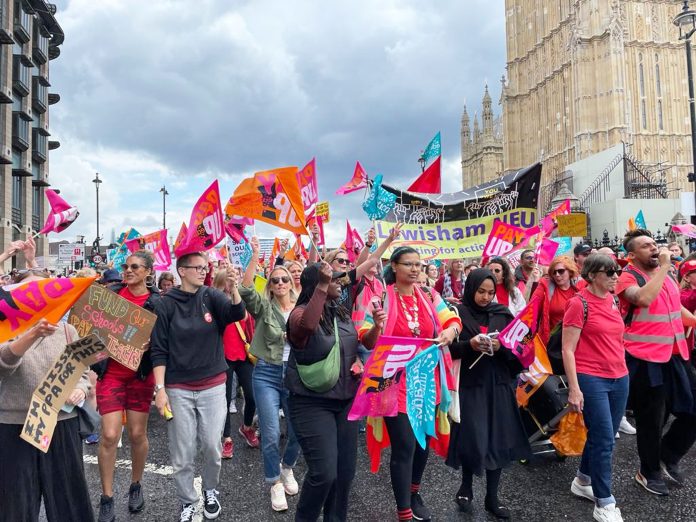As we go to press, National Education Union (NEU) members in England are voting on whether to accept the 6.5% offer from the Tory government as a conclusion to the strikes, or to bank that increase but continue to fight in the autumn for a better, and fully funded, pay offer.
The outgoing general secretaries and majority of the National Executive are campaigning for members to accept. But a third of the executive voted no.
Showing the scale of the anger and debate, 1,000 people attended a Zoom meeting under the banner of ‘Educators say No’, and hundreds are voting in NEU district meetings around the country to reject and fight on.
The five Socialist Party members on the NEU executive have consistently fought for national action, and for a serious, escalating campaign, including support staff. They called a Zoom public meeting on 19 July in order to answer questions and gather together members, reps and district secretaries who want to both campaign for a reject vote, and build a fighting union in the future.
Whereas, unfortunately, the ‘Educators Say No’ meeting was dominated by Socialist Workers Party (SWP) members, who, along with their new allies in Socialist Alternative, excluded Socialist Party members from speaking, this meeting was open to all to ask questions and say what they thought.
Meeting hosted by NEC members in the Socialist Party
The Socialist Party meeting was chaired by Sean McCauley, and Sheila Caffrey introduced the discussion. Sheila said: “For most of us we’re in the last few days of term, exhausted and looking forward to being able to sleep! But this is what the government is banking on in delaying the pay announcement till now.
“The offer is almost half the rate we were fighting for, with nothing extra for this year, and nothing that deals with the decade of pay cuts. It is funded for 3% but the other 3.5% is allegedly already there in schools’ budgets. Those same schools that have already been cutting hours and making redundancies, affecting jobs and affecting children’s life chances. It is an offer that does nothing to address the recruitment and retention crisis. And if you’re in 6th form or FE, there is absolutely nothing.
“Have we won everything we can? I believe we haven’t and that we need to vote to reject that this is the end of the fight. We should use the mandates coming from the reballots now of teachers and support staff to fight for the pay and funding we need. We were told before Easter that that was the final offer. But after four more strike days we got an offer 2% higher and with greater funding. So we’ve proved that striking works! Now let’s look at how we can strengthen hardship funds, build our ballots in the final few days, and hit the autumn term ready to fight.
“If members do reject and vote to continue in the autumn, we need to have a good plan of what this looks like. Some disingenuous members of the executive have been using this lack of a plan as a reason why we can’t continue the action. I say disingenuous because the Socialist Party members on the executive have been putting forward the importance of having next steps in the campaign. But unfortunately there’s been hesitancy on the executive to even discuss this. In May, we tabled a plan for escalating action from the end of September – one day one week, two days the next, three days the next, building to four days after half term – but that discussion has been postponed.
Build a new left in the union
“What do we do if the vote is to accept? We must be clear that we can still fight. We must not demobilise those who are angry. We want to draw those people in, and show that although this would be a setback we are stronger as a union now, with over 70,000 new members joining since February. Our strike action was solid and growing, with new picket lines. Hundreds have stepped forward as reps. We need to link up those people, and build up a rank-and-file organisation that organises in the districts and on the executive to build a democratic fighting union.”
The building of a new left in the union is important for the period ahead. There will be many pressures on the new general secretary, Daniel Kebede: from the Tories, from employers, and from those forces in the union that want to move it away from being a union that is prepared to fight for its members. This will be all the more so as a general election approaches and the pressure is on to keep the unions ‘safe’ for a Starmer-led Labour government that will not deliver for workers or public services.
A left in the union that organises at all levels should, rather than attempt to paper over differences like the current ‘NEU Left’, campaign for the fighting approach necessary and help to organise and channel the counter-pressure of the interests of the members.








